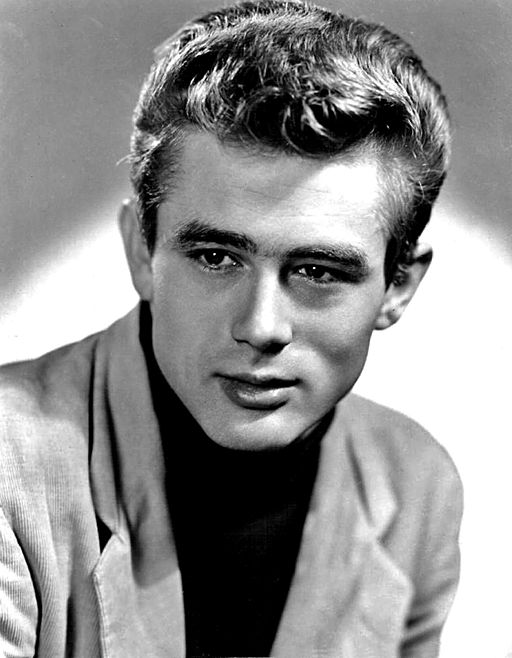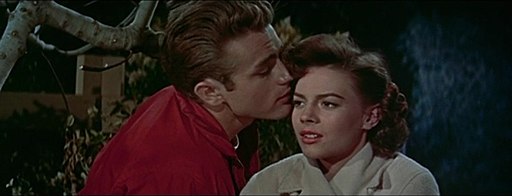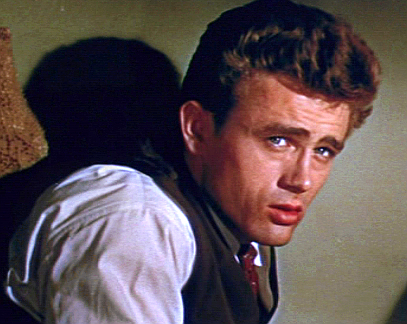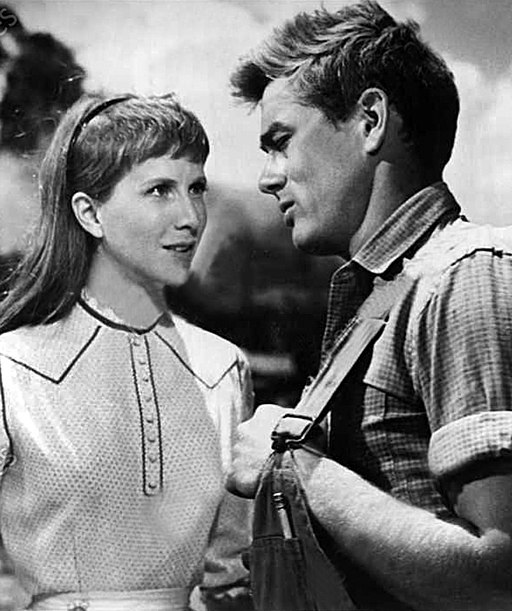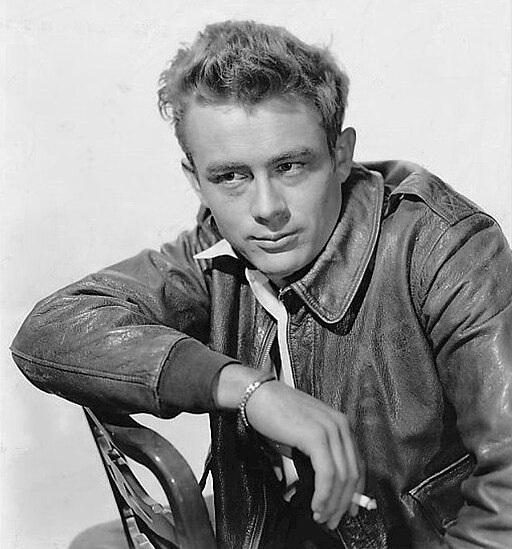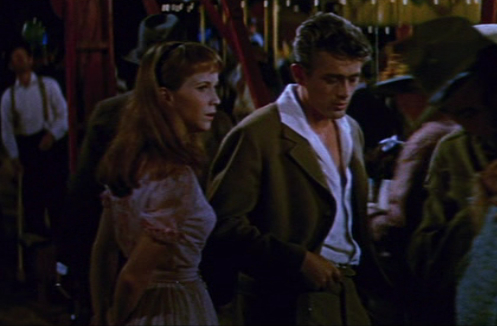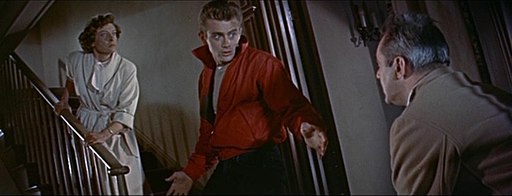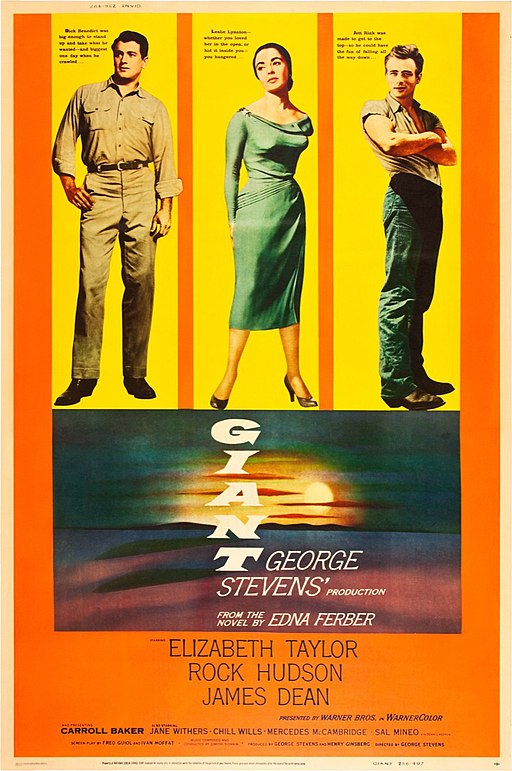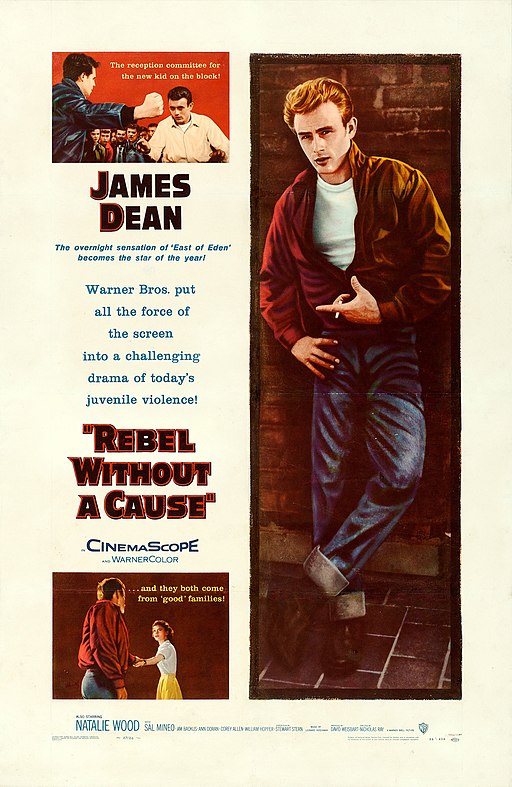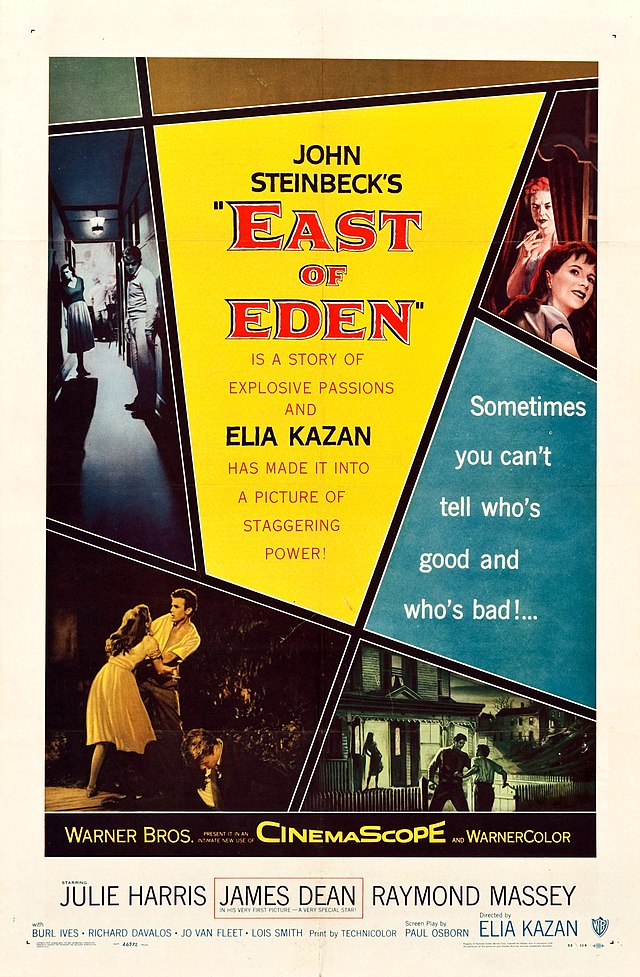James Dean
back| Full Name | James Byron Dean |
| Stage Name | James Dean |
| Born | February 8, 1931 |
| Birthplace | Marion, Indiana, USA |
| Died | September 30, 1955 |
| Buried | Park Cemetery, Fairmount, Indiana, USA |
| Married to | Never married |
| Children | None |
| Notable films | East of Eden (1955) - Rebel Without a Cause (1955) - Giant (1956) |
James Dean
Icon of rebellious youth
James Dean, an icon of American cinema, was born on February 8, 1931, in Marion, Indiana. His early life was marked by the loss of his mother and a subsequent upbringing by relatives in Fairmount, Indiana. He developed an interest in acting during high school and later honed his craft at UCLA and the prestigious Actors Studio in New York.
Dean's rise to stardom was meteoric. He first gained attention with TV roles and stage performances, notably in "East of Eden" (1955), which launched him to fame. His portrayal of emotionally complex characters resonated deeply with the youth of the 1950s. Dean's subsequent films, "Rebel Without a Cause" (1955) and "Giant" (1956), solidified his status as a cultural icon, representing teenage disillusionment and social estrangement.
Tragically, Dean's promising career and life were cut short by a car accident on September 30, 1955, near Cholame, California. He was just 24. His passion for fast cars was well-known, and his death in his Porsche Spyder became a legendary tale of Hollywood tragedy.
Related
James Dean
Biography, analysis and all movies
James Dean, an iconic figure of teenage disillusionment and social estrangement, epitomized the brooding youth in American cinema during the 1950s. Born in Indiana, Dean's early life was marked by tragedy with the death of his mother when he was nine. He was subsequently raised by relatives in Fairmount, Indiana.
Early Career
Dean's interest in drama developed in high school and continued at Santa Monica College and UCLA. He moved to New York to pursue his acting career, where he studied under Lee Strasberg at the Actors Studio. Dean began appearing in television commercials and shows, making his mark with his intense and sensitive performances.
Rise to Fame
Dean's breakout role came in "East of Eden" (1955), directed by Elia Kazan. His performance earned him a posthumous Academy Award nomination. However, it was his role as Jim Stark in "Rebel Without a Cause" (1955), directed by Nicholas Ray, that cemented his legacy. This portrayal of teenage angst and rebellion resonated deeply with the youth of the era.
Final Film
Dean's final film was "Giant" (1956), directed by George Stevens, where he starred alongside Elizabeth Taylor and Rock Hudson. His performance in "Giant" earned him another posthumous Academy Award nomination.
Legacy
James Dean's early death immortalized him as a cultural icon of teenage disillusionment and social alienation. His intense and authentic acting style had a significant influence on subsequent generations of actors. Dean's limited yet impactful body of work continues to be celebrated for its emotional depth and portrayal of youthful angst.
Despite his brief career, James Dean remains a significant figure in American cinema, embodying the restless spirit of youth and the complexities of young adulthood. His legacy endures in the timeless appeal of his performances and the enduring influence he has had on the film industry and popular culture.
Tragic Death of James Dean:
James Dean's death on September 30, 1955, was a tragic event that shook Hollywood and left a lasting impact on popular culture. He was only 24 years old at the time of his death. Here are the details surrounding his untimely demise:
Date and Location
Dean died in a car accident near Cholame, California. The collision occurred at the junction of California State Route 46 (then known as Route 466) and California State Route 41.
The Car
Dean was driving a Porsche 550 Spyder, a car he had recently purchased and was passionate about. He named the car "Little Bastard." Dean was known for his love of fast cars and racing, and he had competed in several races prior to his acting career taking off.
The Journey
On the day of the accident, Dean was driving to Salinas, California, to compete in a sports car racing event. Accompanying him was Rolf Wütherich, a German mechanic. Dean originally intended to tow the Porsche to the race but decided to drive it instead to break it in.
The Accident
At approximately 5:45 PM, a Ford Tudor driven by 23-year-old college student Donald Turnupseed veered into the opposite lane while turning at the junction, colliding almost head-on with Dean's Porsche. The speed and force of the impact caused Dean's car to bounce off the ground and land in a nearby gully.
Injuries and Death
Dean suffered multiple fatal injuries, including a broken neck, fractures of the upper and lower jaw, massive internal injuries, and a broken left leg. Wütherich, the passenger, was thrown from the vehicle but survived with serious injuries. Turnupseed received minor injuries.
Response and Aftermath
Emergency responders arrived quickly, but Dean was pronounced dead upon arrival at the Paso Robles War Memorial Hospital. The news of his death caused an international sensation and left his fans in shock.
Investigation
An inquest into the accident concluded that the speed at which Dean was traveling was a factor, but he was not speeding excessively; estimates suggest he was traveling around 55 to 85 miles per hour. Turnupseed was not charged with any wrongdoing, and the collision was ruled an unfortunate accident.
Legacy
Dean's death cemented his status as a cultural icon. His image as a young, vibrant actor cut down in his prime contributed to the mystique that surrounded him. The crash site and the route he traveled have become landmarks for fans and enthusiasts.
The accident also raised awareness about road safety and the dangers of high-speed driving. Dean, who ironically had filmed a public service announcement promoting safe driving just days before his death, became an unwitting symbol of the need for caution on the road.
In summary, James Dean's death was a combination of unfortunate circumstances and a moment of miscalculation on a public highway. It remains one of Hollywood's most notable tragedies, marking the early end of a promising career and the life of a star who had captured the imagination of a generation.
Movies featuring James Dean:
1955:
"East of Eden":
Directed by Elia Kazan, this film is an adaptation of John Steinbeck's novel. Dean plays Cal Trask, a young man struggling with the perceived favoritism his father shows to his brother Aron. Set in California before World War I, it's a tale of sibling rivalry, family conflict, and a quest for paternal approval. Dean's performance, marked by its intensity and emotional depth, was critically acclaimed.
"Rebel Without a Cause":
Directed by Nicholas Ray, Dean stars as Jim Stark, a troubled teenager who grapples with feelings of alienation and rebellion. The film, set against a suburban backdrop, explores themes of teenage angst, societal expectations, and the struggles of youth. Dean's portrayal of Stark became an enduring symbol of adolescent rebellion.
1956:
"Giant":
Directed by George Stevens, this epic film chronicles the life of a Texas cattle rancher (played by Rock Hudson) and his family over a span of 25 years. Dean plays Jett Rink, a surly ranch hand who strikes oil and becomes wealthy. His character ages significantly over the course of the film, showcasing Dean's versatility as an actor. The film explores themes of wealth, class, and racism.
Though James Dean's filmography is brief, his impact on cinema is significant. His performances in these films are noted for their emotional intensity and have left a lasting imprint on film history.
Analysis of James Dean's acting style:
James Dean's acting style was revolutionary for its time and profoundly influential in the history of film acting. He brought a raw, intense, and deeply emotional approach to his roles, which was characterized by several key elements:
Method Acting Techniques
Dean was one of the first American actors to bring the techniques of the Method, an acting approach developed from the teachings of Konstantin Stanislavski and popularized by Lee Strasberg at the Actors Studio in New York. This style emphasized emotional authenticity and deep psychological exploration of the character. Dean immersed himself fully into his roles, drawing upon his personal experiences and emotions to fuel his performances.
Naturalism and Realism
Dean's performances were marked by a naturalistic and realistic approach. He avoided over-the-top theatricality, instead opting for subtlety and authenticity in his expression of emotions. His ability to portray characters with a sense of real-life complexity and vulnerability made his performances relatable and compelling.
Physicality and Improvisation
Dean was known for his distinctive use of physical movement and gestures, often improvising these elements to add depth and authenticity to his roles. His body language was expressive and often non-conformist, breaking away from the rigid conventions of film acting at the time.
Intensity and Sensitivity
Dean had a unique ability to convey both intensity and sensitivity in his performances. He could portray strong, brooding characters while simultaneously revealing their inner turmoil and vulnerability. This duality made his characters multi-dimensional and intriguing.
Emotional Depth
Perhaps the most striking aspect of Dean's acting was his capacity to convey deep emotional pain and existential angst. He tapped into a sense of youthful disillusionment and rebellion that resonated powerfully with audiences, particularly teenagers and young adults of the era.
Impact and Influence
Dean's style influenced a generation of actors who followed, shifting the landscape of film acting towards a more introspective and emotionally driven approach. Actors like Marlon Brando and Montgomery Clift were also part of this movement, but Dean's tragic early death and the intensity of his performances gave him a lasting mystique and influence.
In summary, James Dean's acting style was groundbreaking for its emotional depth, naturalism, and intensity. He brought a new level of psychological realism to film acting, leaving a legacy that continues to influence actors and filmmakers today.
Awards and Nominations:
Academy Awards (Oscars):
- Nominated for Best Actor for "East of Eden" (1956). This nomination was significant as it was Dean's first major role in a feature film, and the performance was widely praised for its depth and intensity.
- Posthumously Nominated for Best Actor for "Giant" (1957). Dean's portrayal of Jett Rink, a non-conformist ranch hand who strikes oil, was his final role and is often cited as one of his most memorable performances.
Golden Globe Awards:
- Won the Special Achievement Award for "Best Dramatic Actor" for "East of Eden" (1956). This posthumous award recognized his exceptional performance in the film.
- Received a Special Citation for being a "cultural icon." This was awarded posthumously in recognition of his enduring influence on film and popular culture.
BAFTA Awards:
- Nominated for Best Foreign Actor for "East of Eden" (1956) and "Rebel Without a Cause" (1956). These nominations acknowledged his compelling performances and his impact on audiences and critics alike.
Remarkable quotes from James Dean:
On Living and Dying:
- "Dream as if you'll live forever. Live as if you'll die today."
On Personal Growth:
- "The only greatness for man is immortality."
On Individuality:
- "If a man can bridge the gap between life and death, if he can live on after he's dead, then maybe he was a great man."
Reflecting on Success:
- "To my way of thinking, an actor's course is set even before he's out of the cradle."
On Aspirations:
- "I want to be a Texan 24 hours a day."
On Personal Struggle:
- "Being an actor is the loneliest thing in the world. You are all alone with your concentration and imagination, and that's all you have."
Analysis of James Dean’s performance in “Rebel Without a Cause”:
James Dean's performance in "Rebel Without a Cause" (1955) is a defining moment in film history, capturing the essence of teenage angst and alienation in the 1950s. His portrayal of Jim Stark, the troubled protagonist, is a powerful study in raw emotion, vulnerability, and intensity.
Emotional Intensity
Dean's portrayal of Jim Stark is characterized by an intense emotional depth. He conveys a spectrum of feelings – from anger and frustration to pain and vulnerability – often within a single scene. His ability to project these emotions so vividly helped to make the character relatable and sympathetic to a generation of young people.
Physicality and Method Acting
Dean was a practitioner of Method acting, and this is evident in his physical embodiment of the character. His body language, gestures, and movements all contribute to the portrayal of a restless, misunderstood teenager. The famous scene where he drunkenly stumbles into his house, for instance, showcases his ability to use physicality to express inner turmoil.
Improvisational Skill
Dean's performance had an improvisational quality that added to its authenticity. He was known for going off-script to bring a more natural feel to his dialogue and interactions, making Jim Stark feel like a real, living person rather than just a character in a script.
Vulnerability and Sensitivity
Amid the angst and rebellion, Dean infused his character with a sense of vulnerability and sensitivity. This is particularly evident in scenes with Judy (played by Natalie Wood) and Plato (played by Sal Mineo), where Stark reveals his longing for connection and understanding.
Cultural Impact
Dean's portrayal resonated deeply with the youth of the time. He captured the feelings of disillusionment and rebellion against the societal norms of the 1950s, becoming an icon for teenage defiance and angst. The red jacket, white T-shirt, and jeans he wore in the film became symbols of youthful rebellion.
Legacy
Dean's performance in "Rebel Without a Cause" has left an indelible mark on cinema. It not only defined his career but also influenced future portrayals of troubled youth. His ability to convey deep, complex emotions with authenticity made the character iconic and set a new standard for actors portraying internal conflict and emotional turmoil.
In summary, James Dean's performance in "Rebel Without a Cause" is a masterful display of emotional depth, physicality, and authenticity. It stands as a testament to his extraordinary talent and his understanding of the human condition, particularly the struggles of adolescence.
Analysis if James Dean’s role as Jett Rink in the film “Giant”:
James Dean's performance in "Giant" (1956), his final film, showcased a different facet of his acting prowess compared to his earlier roles. Directed by George Stevens, "Giant" is an epic drama about a Texas cattle ranching family, and Dean played the role of Jett Rink, a surly ranch hand who becomes wealthy after striking oil. This role allowed Dean to exhibit a broader range of acting skills over the character's progression.
Character Evolution
One of the most striking aspects of Dean's performance in "Giant" is his portrayal of Jett Rink's evolution. Dean convincingly transforms Rink from a young, rebellious ranch hand to a wealthy, yet embittered, oil tycoon. This character arc required a significant range in acting, depicting not only the physical aging process but also the psychological changes that occur due to wealth and unrequited love.
Physicality and Method Acting
Dean's method acting background is evident in the way he immersed himself in the character. His physical transformation over the course of the film is notable – from the youthful energy of the early scenes to the older, more worn-out demeanor later on. Dean's body language and mannerisms effectively convey Rink's internal journey.
Depth and Complexity
Dean imbued Jett Rink with a deep sense of complexity and internal conflict. His portrayal reflected Rink's ambition, jealousy, and vulnerability, especially in his interactions with the film's other characters. Despite Rink's antagonistic traits, Dean's performance elicited empathy, highlighting the character's loneliness and unfulfilled desires.
Emotional Intensity
As with his other roles, Dean brought an emotional intensity to Jett Rink. This intensity was particularly evident in scenes where Rink confronts his feelings of inferiority and his unrequited love for Leslie Benedict (played by Elizabeth Taylor).
Impact on the Film
Dean's performance added a significant dynamic to "Giant," providing a counterpoint to the other characters, portrayed by Rock Hudson and Elizabeth Taylor. His portrayal of Jett Rink added depth to the film's exploration of themes such as wealth, class, and racial prejudice.
Posthumous Acclaim
Dean's untimely death before the film's release added a layer of poignancy to his performance. He was posthumously nominated for the Academy Award for Best Actor, a testament to the strength of his performance.
In summary, James Dean's role in "Giant" was a testament to his versatility as an actor. He delivered a performance that was nuanced and layered, capturing the complexity of Jett Rink's character over a span of many years. Dean's portrayal in "Giant" reinforced his status as a talented actor capable of conveying deep emotional and psychological depth.

